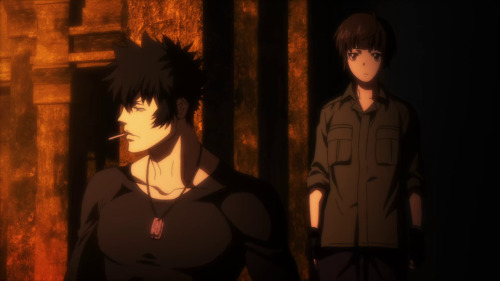Disconnected thoughts on the Psycho-Pass film

-
You might remember that the second season of the Psycho-Pass TV series was basically narratively inconsequential. Since its release schedule suggests that it was being worked on in parallel with this movie, I’ve long suspected that this was a deliberate decision by the writers to keep plot contradictions from popping up. The film does nothing to disabuse me of this notion, since it seems content to proceed as if virtually all of PP2 never happened. Which is perfectly fine by me, since the behavior of the Sibyl System is core to the movie’s plot, and PP2 made it too subject to the whims of individuals to be truly menacing.
-
Speaking of which, fansubbers, it’s spelled S-i-b-y-l. As in, you know, the Sibyls of Greek myth. Not S-y-b-i-l. The correct spelling is onscreen more than once, for crying out loud.
-
There is a lot of badly-pronounced English in the movie, which isn’t really necessary. I suppose it’s a reasonable choice of language for a multinational union of Southeast Asian countries, but it’s still a little hard to sit through the Japanese voice actors’ middling inflections. I’m keeping my fingers crossed for an official version that splices together the Japanese and English dubs, though even then they’ll all sound like Americans and not real Cambodians or Thais or Malaysians or what have you. Oh, well.
-
EGOIST’s “Nameless Beasts” really is a great song.
-
Mika, Akane’s junior colleague as Inspector, still has her air of superiority about her, but given that she only has a handful of lines in the movie, I’m willing to forgive the lack of development. If it hadn’t been for the awful way she was handled in PP2, I doubt many people would give her behavior here a second thought. The rest of the characters introduced by the previous season basically only exist as extras, which isn’t much of a change from before, come to think of it. Maybe a third TV series would do them some good.
-
There’s a lot packed into the film’s 114-minute runtime, and as a result some major plot threads are resolved only hurriedly in the end, perhaps a consequence of the definite tilt towards explosive action sequences and visceral hand-to-hand fights. This is nowhere near the triumph that Gen Urobuchi’s earlier work on Madoka: Rebellion was. Still, though, the movie manages to do what PP2 couldn’t and extend the world to a new setting, new characters, and new conflict. We learn much more about what the Sibyl System was designed to protect its citizens against. We realize that systems, like humans, seek their own survival. And we feel that slight allegorical twinge, as if the contradiction of violence for peace were an important question on the minds of Japanese viewers right this very moment.
-
Seven is a great number to end on, don’t you think?